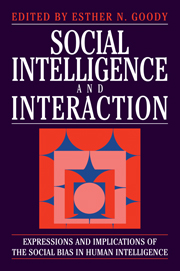 Social Intelligence and Interaction
Social Intelligence and Interaction Book contents
- Frontmatter
- Contents
- List of contributors
- Conventions used in transcripts
- Preface
- Introduction: some implications of a social origin of intelligence
- Part I Primary processes
- Part II The interactive negotiation of meaning in conversation
- Part III Genres as tools that shape interation
- Part IV Expressions of a social bias in intelligence
- 9 Divination as dialogue: negotiation of meaning with random responses
- 10 Social intelligence and prayer as dialogue
- 11 Interactional biases in human thinking
- 12 Stories in the social and mental life of people
- Consolidated bibliography
- Index
9 - Divination as dialogue: negotiation of meaning with random responses
Published online by Cambridge University Press: 09 January 2010
- Frontmatter
- Contents
- List of contributors
- Conventions used in transcripts
- Preface
- Introduction: some implications of a social origin of intelligence
- Part I Primary processes
- Part II The interactive negotiation of meaning in conversation
- Part III Genres as tools that shape interation
- Part IV Expressions of a social bias in intelligence
- 9 Divination as dialogue: negotiation of meaning with random responses
- 10 Social intelligence and prayer as dialogue
- 11 Interactional biases in human thinking
- 12 Stories in the social and mental life of people
- Consolidated bibliography
- Index
Summary
In her introduction Goody proposes AIP as a set of fundamental assumptions pervasive in human society. In this chapter I shall examine some of the implications of AIP for the subject of divination. Divination is an extremely widespread phenomenon which illustrates the ‘dialogic template’. (It has also been used to illustrate communication without intention (Du Bois 1987).) The AIP template underlies the adjacency pair organization which structures conversation. To speak is to assume the possibility of a response. In particular, to question is to assume the possibility of an answer. Goody (Chapter 10, this volume) discusses prayers which may receive non-verbal replies, but from the point of view of the believer the prayers are answered.
Divination provides a means of asking questions. The questions are usually those which cannot be answered by other means available. Examples are questions such as ‘Will my child recover from this illness?’, ‘Will there be an accident on the road if I travel tomorrow?’, ‘What is the cause of this misadventure?’ and so on.
It is possible to do divination as a game, as a procedure without any cognitive or emotional load being carried. However, such cases (which occur both in Europe and elsewhere) are aberrant. They point to the usual perceived purpose of divination: to find answers to questions. Generally, divination is used as a means of resolving problems. Some corollaries of this will now be examined. If we view divination as the pursuit of answers to questions we can apply some of the insights of conversational analysis to understand the details of a divination session.
Information
- Type
- Chapter
- Information
- Social Intelligence and InteractionExpressions and implications of the social bias in human intelligence, pp. 189 - 205Publisher: Cambridge University PressPrint publication year: 1995
Accessibility standard: Unknown
- 7
- Cited by